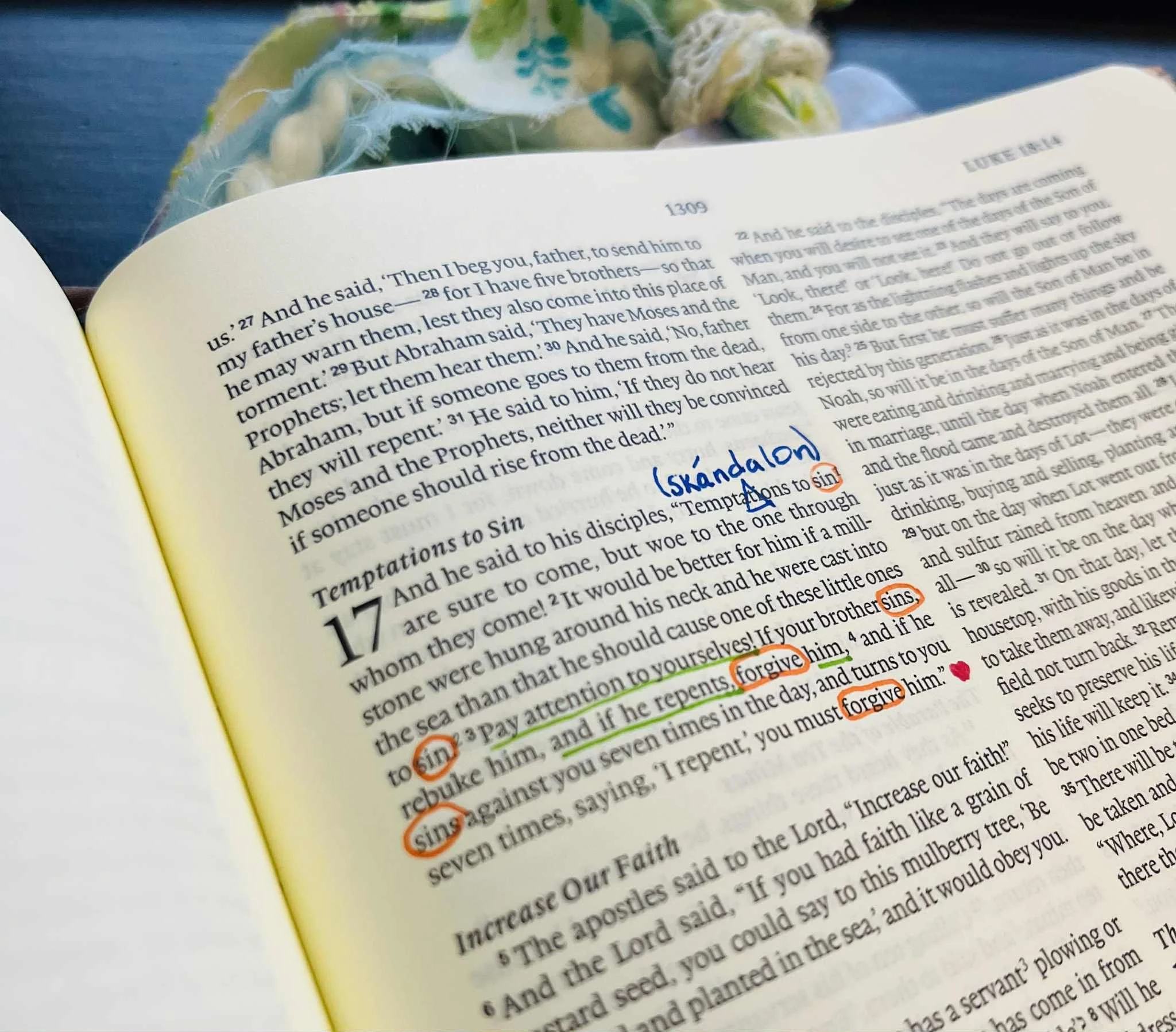The Offense Cycle: Luke 17:1–4
We like to think offense is something we hold against someone else, but truthfully, it’s what holds us
A Margins Method™ Scripture Study
1. Grounding & Presence
Before you open your Bible, pause.
Feel your breath anchor you in the moment.
Touch the page—real paper, real ink—and whisper,
“Holy Spirit, help me see what’s true, not just what hurts.”
Let your body soften where it’s holding the last argument, the last disappointment, the story still running circles in your head.
2. Read the Text Slowly
Luke 17:1–4 (ESV)
“And he said to his disciples, ‘Temptations to sin are sure to come, but woe to the one through whom they come! It would be better for him if a millstone were hung around his neck and he were cast into the sea than that he should cause one of these little ones to sin. Pay attention to yourselves! If your brother sins, rebuke him, and if he repents, forgive him, and if he sins against you seven times in the day, and turns to you seven times, saying, “I repent,” you must forgive him.’”
3. Context & Word Work
Jesus is speaking to His disciples—not to the crowd. He’s training those who will carry His ministry after Him, warning them about the inevitable skandalon—the Greek word for “stumbling block” or “snare.”
It’s where we get scandal. It describes a baited trap—something that lures and catches.
Offense works like that.
It doesn’t always start with betrayal. Sometimes it starts with misunderstanding, unmet expectation, or pride brushed the wrong way. But once the heart takes the bait, the nervous system follows.
When we stay offended, our body reads it as danger.
Adrenaline and cortisol keep us in guard mode. Muscles tense. Sleep breaks. The body replays what the mind rehearses.
Jesus wasn’t just giving a moral command; He was offering a way out of captivity—body and soul.
4. Mark the Text
As you read again, mark your Bible using the Margins Method™:
○ Circle repeated words like sin and forgive — they frame the cycle.
— Underline “Pay attention to yourselves.” That’s the pivot point.
❤️ Heart “You must forgive him.” That’s the promise of freedom, not pressure.
~~~ Wavy underline what shows God’s heart: His care for “little ones,” His desire that none be trapped.
▲ Triangle beside s temptations to sin (skandalon)— it’s worth a deeper word study later.
Notice how the command to forgive sits inside a conversation about avoiding snares. Forgiveness is the unhooking.
5. Reflect & Respond
We like to think offense is something we hold against someone else, but truthfully, it’s what holds us.
Every time we replay the scene, the body relives it.
Every time we justify the anger, our mind builds another wall to guard it.
Jesus says, “Pay attention to yourselves.”
That’s not self-centeredness—it’s self-awareness.
Notice when your chest tightens at a name. When your jaw locks remembering what she said.
That’s the nervous system telling you it’s still trying to finish a story that ended badly.
Forgiveness doesn’t erase what happened. It ends the body’s need to keep protecting you from it.
It’s how peace reenters the bloodstream.
6. Grace Practice — Unhooking the Heart
Sit with your palms open.
Picture the hook of offense—not as the person, but as the moment you keep carrying.
Breathe in: “Lord, You see me.”
Breathe out: “I release what I can’t fix.”
If you can, name one boundary or act of honesty that keeps you safe without staying stuck. Forgiveness is not the absence of boundaries; it’s the refusal to live poisoned behind them.
7. Journal Reflection
Where do I still feel the weight of offense in my body?
What would releasing it look like—not in theory, but in a moment this week?
What truth about God’s protection do I need to star in my margins today?
When Jesus says “you must forgive,” it’s not because He’s dismissing your pain—it’s because He’s already carried it.
Forgiveness is the nervous system remembering that you’re safe again.
